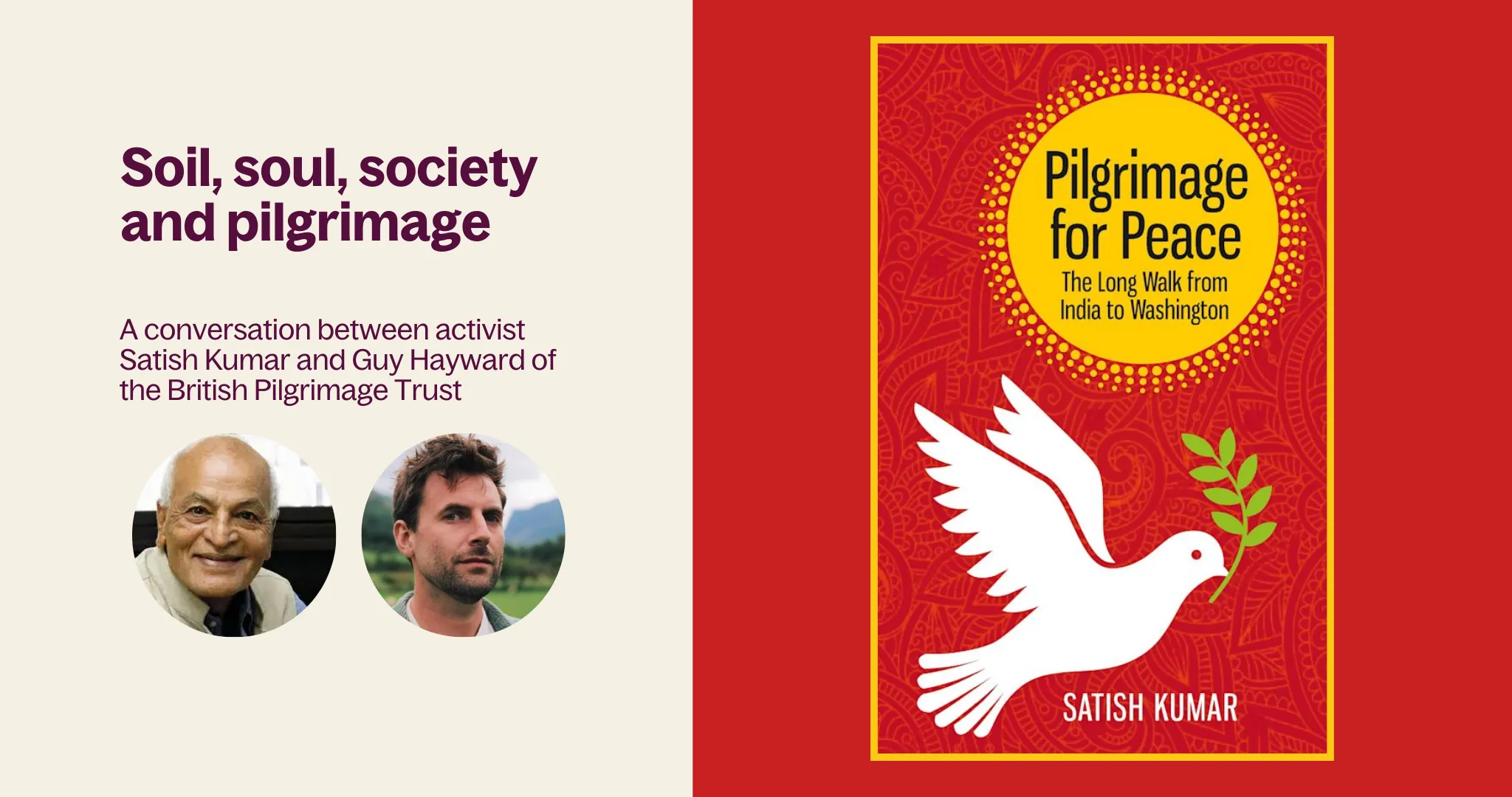Why Pilgrimage Now?
15
May
,
2025


How is pilgrimage an ancient answer to the challenges of modern times?
Over the last 11 years since founding the British Pilgrimage Trust, I have often been asked the question "why pilgrimage?" and "why now?" The tradition of pilgrimage is ancient, and since medieval times has seemingly been ‘owned’ by religion. But what purpose does it have today, in a world that feels increasingly secular?
In an increasingly materialistic and consumerist society, people start to seek meaning, purpose and authenticity more — and this search today doesn’t necessarily manifest as traditional religious beliefs. Pilgrimage offers a flexible, non-dogmatic 'bring your own beliefs' form of spiritual expression accessible to all, through which people can feel safe to explore what is meaningful to them.
Correspondingly, there's been a rise in experiential and transformative travel, as opposed to consumerist travel, where the traveller contributes more to their own journey.
Eco-awareness and Nature Connection - the growing climate consciousness has boosted interest in eco-friendly ways of being. Pilgrimage, inherently low-carbon and sustainable through extended periods of walking, appeals strongly to those seeking slow travel and reduced ecological impact and increased connection to nature and the land, by walking rivers, through fields, woodlands, gardens, and along footpaths. Also, when you feel connected to nature, and love the land more, you’re then more likely to care for it.
People want digital detoxes and mindful living, and the exhaustion that arises from being sucked into the virtual world via screen addiction has led to the appeal of pilgrimage as an offline experience, in which you visit high-quality real places looking out into the world more than your phone.
There is lots of evidence from mental health studies of people suffering increased anxiety, loneliness, and depression. We have found that walking pilgrimages provide therapeutic benefits via mindfulness, walking meditation, physical activity, connection with nature, and gratitude, all of which are known to help with mental health issues. Nurturing a better relationship with your own body (and by extension the ‘body’ of the earth), and becoming what people called ‘embodied’, is a big part of mental healing.
Body awareness is essentially an invitation to listen deeply, to feel fully, and to inhabit our physical and emotional selves completely, and it happens naturally through extended walking. When we engage these aspects with heightened body awareness, we can enable authentic confrontation with our suppressed fears, doubts, and uncertainties. In doing so, we move beyond abstract thinking, grounding ourselves in a visceral experience that catalyses transformation.
In the UK, walking with groups is now ‘socially prescribed’ on the NHS. And an increasing number of therapists are doing their sessions outside, walking, because it's more conducive to opening up than sitting in a room on a chair, perhaps because you are loosening up through movement and not looking at each other in the eye.
Perhaps some of these issues can be attributed to a breakdown of traditional community. There's also been a cultural reorientation in Britain towards rediscovering local heritage, landscapes, and traditions. Pilgrimage routes reconnect people to history, local communities and regional folk identities, and connects both pilgrims to communities and communities to pilgrims. A pilgrim carrying a wooden staff is more approachable than your average hiker.
I have written more here about the spontaneous hospitality that pilgrims enjoy, tapping into the old ‘traveller’ mindset, even in this day and age. This local community reconnection pushes back against the homogenisation brought upon us by multi-national corporations and globalisation. The cost of convenience is being balanced now by the resurgence of lost skills and ancient traditions like pilgrimage to nurture life once again.
There is the even wider ‘community’ of our ancestors too, and we are witnessing an increase of interest in tracing one’s personal familial ancestry, through websites like ancestry.com, and pilgrimage provides a practice through which you can connect with your ancestral lands based on these records. But also as you pass through any community you are connecting with their ancestors too, realising we are part of a long line of human life.
In an increasingly polarised and fragmented society, pilgrimage literally provides common ground, walking alongside each other, either as a lone pilgrim meeting strangers, or walking with companions, with a common purpose and destination, across social divides, bringing together diverse groups and promoting intercultural understanding and dialogue. There is something about walking side by side, when you aren’t looking into each others’ eyes…and when you are further self-identifying as ‘pilgrims’ you are also more likely to drop into a deeper conversation.
Together, these themes illustrate that the recent flourishing of pilgrimage in Britain and around the world is not merely a transient fashion, but rather a cultural response to deep-rooted needs. In an age defined by mental health challenges, rapid digitalisation, environmental anxiety, and spiritual searching, pilgrimage provides a compelling practice as an answer—offering a meaningful, holistic, and embodied way to navigate personal and collective transformation. The groundwork laid over the past decade has coincided powerfully with broader shifts toward authenticity, sustainability, community, and experiential living, suggesting pilgrimage’s continued growth and significance in Britain for years to come.
by Guy Hayward
Further reading
.webp)
.svg)
.svg)





_-_geograph.org.uk_-_1626228.webp)
Comments
0 Comments
Login or register to join the conversation.
Tom Jones
Lorem ipsum dolor sit amet, consectetur adipiscing elit. Suspendisse varius enim in eros elementum tristique. Duis cursus, mi quis viverra ornare, eros dolor interdum nulla, ut commodo diam libero vitae erat. Aenean faucibus nibh et justo cursus id rutrum lorem imperdiet. Nunc ut sem vitae risus tristique posuere.
Tom Jones
Lorem ipsum dolor sit amet, consectetur adipiscing elit. Suspendisse varius enim in eros elementum tristique. Duis cursus, mi quis viverra ornare, eros dolor interdum nulla, ut commodo diam libero vitae erat. Aenean faucibus nibh et justo cursus id rutrum lorem imperdiet. Nunc ut sem vitae risus tristique posuere.